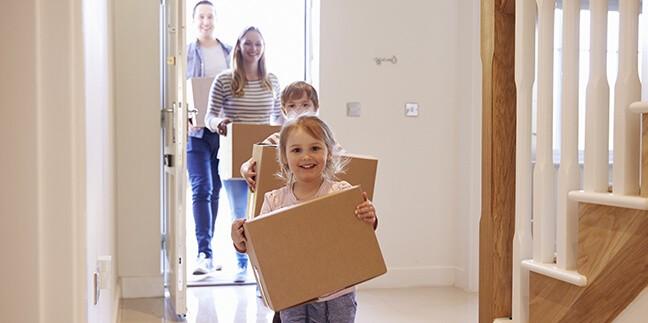How to move house safely during COVID-19
Moving house (or apartment) is stressful at the best of times. But add in a global health pandemic and a stage-3 lockdown, and moving can become an even more complicated affair.
We explain how to stay safe and follow public health directives when moving, whether renting or buying.
The information in this article is accurate at the time of publishing. But the situation is evolving quickly, so keep an eye out for government updates or call the national coronavirus helpline on 1800 020 080.
In most cases you should be able to move home, but there may be some restrictions.
In a word – probably. The broad directive from the federal government is simply to stay at home. But there are a number of exemptions, which vary from state to state. In general, you should be able to move house you've bought or are renting, as long as you follow your state or territory's laws on social distancing and public gatherings.
ACT: There is currently no specific legislation preventing people from leaving their home. The operator we spoke to on the COVID-19 helpline indicated that moving house is allowed.
NSW: Yes, moving is a reasonable reason to leave your home.
NT: There are currently no fines for leaving your home for non-essential reasons, although this may change.You should be able to move house without incident.
QLD: People moving to Queensland from other states are exempt from the border closure. The state government website says: "You will also be allowed to enter Queensland if you are moving to make Queensland your permanent place of residence, but you must enter quarantine for 14 days (which could be at your new residence)."
SA: There are currently no fines for leaving your home for non-essential reasons, although this may change. The operator we spoke to at the SA COVID-19 Information Line indicated that moving house is considered essential and should be allowed.
Tas: Performing essential maintenance or inspections on a property you own is allowed, as is "attending another location if you have a reasonable excuse to attend the location in the opinion of the Director of Public Health." So it is likely that you'll be able to move home but it's not explicitly stated.
Vic: Yes, moving is a reasonable excuse to leave your home.
WA: The WA government strongly advises people to stay home.The operator we spoke to at the 13COVID helpline said people should use "common sense" to determine whether or not their move was essential (e.g. the end of a lease) and, if so, whether it would count as a valid exemption to the advice to stay home.
ACT, NSW and Vic: The borders of these three states are still open and people entering don't need to go into compulsory isolation or quarantine, so moving here should be relatively uncomplicated.
NT: You can move interstate to the Northern Territory, but you'll need to fill in a border arrival form and complete 14 days of forced quarantine on arrival. Forced quarantine means you'll be escorted to a designated location where you'll be monitored for 14 days. You'll have to cover the accommodation costs for this period yourself.
QLD: The Queensland border is closed. But if you're moving there to live, you're considered an "exempt person" and you can enter as long as you apply for an entry pass and complete a 14-day quarantine once you arrive.
SA: You can move interstate to South Australia, but you'll need to self-quarantine for 14 days on arrival.
Essential travellers are exempt from compulsory quarantine when crossing borders.
Tas: You can move interstate to Tasmania, but you'll need to fill in a Tasmanian arrivals form and complete 14 days of self-isolation in government-provided accommodation.
WA: The WA border is closed and the state is also divided into nine regions that residents can't move between without an exemption.If you want to move to WA from another state, you'll have to apply for a special exemption for non-essential travellers. Unless there are extenuating circumstances, you may not be able to enter WA.

As for moving from one region to another within WA, "returning to a place of residence" is listed as an exemption to the regional travel restrictions, so you'll probably be allowed through the checkpoint if you bring proof of your new address.
Essential travellers are exempt from compulsory quarantine when crossing borders, but you'll need to check the state's published list of exemption criteria to see if you qualify.
Removalists can still operate during the COVID-19 pandemic.
Yes. Transport and logistics are classified as essential services nationwide, so removalists can still operate. This means they can enter your home to perform their duties, although you'll need to practise social distancing.
They're also exempt from border closures and quarantine requirements, so you can use a removalist if you're moving interstate.
Yes. Car rental companies are still open across Australia. But some branches are temporarily closed, so make sure you check the company's website to find your nearest one.
If you're planning to get a friend to help you move, remember to follow the nationwide social distancing guidelines and two-person rule (which is being applied slightly differently by each state and territory).
Given the restrictions on leaving your home for non-essential reasons (helping a friend move is unlikely to be considered "essential"), you might be better off hiring removalists instead.
The federal government has announced a nationwide ban on open-home inspections, but one-on-one private inspections are still allowed. Many agents have also made efforts to transfer most of the home-hunting process online (through virtual tours, for example).
Head of property management for The Hopkins Group, Lorena D'Amico, says real estate agents are working hard to adapt their practices to the government's rapidly evolving directives.
"We've implemented 360-degree virtual reality tours of our properties so tenants can do a digital walk through," she says.
If a potential tenant likes what they see, they can apply online and wait until they've been approved before committing to a private in-person inspection.
"You can book an inspection time online and we will provide hand sanitiser and gloves as well as maintaining social distancing and advising potential tenants not to touch anything during the inspection," she says.
"You can then sign your lease online and the agent will meet you at the property to hand over the keys so you don't need to travel to our office."
If a rental property is occupied, the inspection must take place when the tenants are out of the property for an acceptable reason (shopping, work, exercise or care). Only two people – the real estate agent and one other person – are allowed on the premises at the same time.
Use Google Maps and Street View to take a virtual stroll through the neighbourhood.
Moving into a rental property is relatively straightforward. But looking for a new share house is much more complicated.
Steve Caddy, executive manager of popular share accomodation website Flatmates, says households should keep the number of in-person inspections to a minimum by conducting online video interviews and inspections.
"At Flatmates we're just about to launch our own video tours, which will allow members to upload a video tour of their home and their flatmates, to help cut down the number of video calls or interviews that need to be done," says Caddy. "It will also help the house seeker to quickly decide if the house is right for them."
Unfortunately, there has been no specific legislation or guidance around moving into a share house. This raises a particular issue in states such asVictoria and NSW, where home visitors generally aren't allowed.
Because this is a legal grey area, common sense and caution are the best guides. Adopting the same practices the real estate industry is using for house inspections is probably your safest bet:
It's impossible to know for sure what a stage-4 lockdown would look like for Australia, but the current situation in New Zealand is probably a good guide.
We care about accuracy. See something that's not quite right in this article? Let us know or read more about fact-checking at CHOICEJoin the conversation
To share your thoughts or ask a question, visit the CHOICE Community forum.







